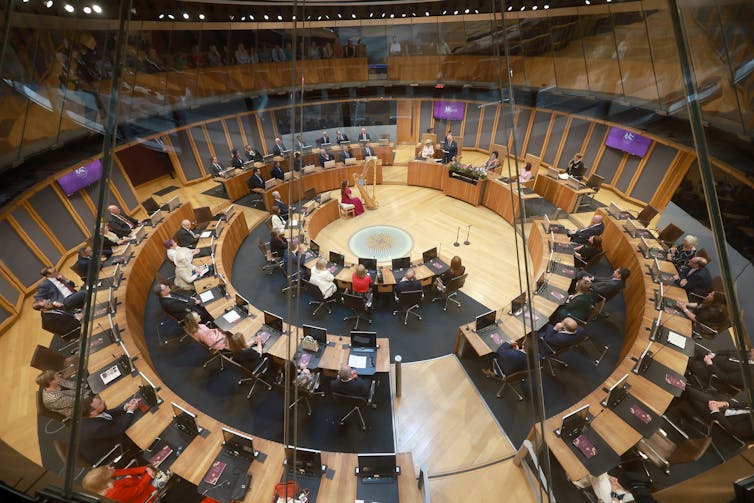
After months of turmoil, Welsh Labour has elected a new leader, its second in just five months and third this year. The contest was triggered by the resignation of Vaughan Gething, who was forced out after four senior politicians in his government resigned.
Eluned Morgan is the first woman to lead Welsh Labour and, as a result, is expected to become Wales’s first female head of government. The current cabinet secretary for health, social care and Welsh language, Baroness Morgan of Ely will also become the first peer to lead a government in the UK since Alec Douglas-Home in 1963.
While facing criticism for her management of the NHS in Wales, Morgan has significant political experience, having been a member of the European Parliament between 1994 and 2009 and a shadow minister in the House of Lords. She has promised “strength, stability and unity”, with those backing her unanimously declaring she has the ability to unite the fractured party.
Labour’s general election success should see the party in Wales in a buoyant and proactive mood. But while the UK’s new prime minister, Keir Starmer, has been busy preparing a programme for government, with a raft of policies being announced since his election on July 4, in Wales Labour is in a period of recovery.
The collapse of the cooperation agreement between Welsh Labour and Plaid Cymru in May has left Welsh politics in something of a stalemate. It is now harder for the government to operate, as Morgan’s party does not have an overall majority in the Senedd.
With less than two years to go until the next Senedd election in May 2026, Welsh Labour will hope Morgan can help it move on from recent events, winning back the support it has lost and reviving its reputation.
Read more: How Vaughan Gething’s short period as first minister fell apart – and what it means for Welsh Labour
But the people of Wales may be left wondering what’s in it for them. Public services are struggling, educational standards are in decline, and poverty in Wales is at an appalling level. The new leader may bring about stability and unity for Welsh Labour, but there are currently very few signs this will improve people’s lives in Wales.
Throughout the 2024 UK election campaign, Welsh voters were told that having two Labour governments working together would bring benefits to Wales. But the first test of this has already been failed.
To aid the Welsh government’s child poverty strategy (last updated earlier this month), scrapping the two-child benefit cap would lift 65,000 children in Wales out of poverty. Yet the new chancellor, Rachel Reeves, has insisted the UK government will not do this, and this week it voted against an amendment to get rid of the two-child cap. While some argue it will be scrapped sometime in the future, that will be of little relief to the thousands experiencing poverty now.
Want more politics coverage from academic experts? Every week, we bring you informed analysis of developments in government and fact check the claims being made.
Sign up for our weekly politics newsletter, delivered every Friday.
There are also questions as to how having Labour governments in both Cardiff and London will improve Wales’s public services. While Morgan campaigned to “modernise our NHS” during the recent general election, the people of Wales may be wondering why the Welsh government, responsible for the Welsh NHS, has not been able to do this already. If no new money comes from the UK government, it is difficult to see what new mechanisms the Welsh government will adopt to tackle the problems facing the NHS.

Dominance and renewal
What is clear is that renewal is vital for a party which has been in power since devolution began in 1999. The political scientist Maurice Duverger warned that domination diminishes “the need for innovation” and “takes the zest from political life”. While defeat often leads a party to reflect and re-orientate itself, there is less incentive for a party to do so when it remains in power for so long.
There are several signs that Welsh Labour is experiencing such a crisis of dominance. Declining support for Labour in Wales, the rise of Reform and the increased support for Plaid Cymru at the recent general election should give Welsh Labour politicians pause for thought.
The lack of a leadership contest, due to Morgan being elected unopposed, has denied Welsh Labour the opportunity to reflect at a time when new ideas are needed to tackle Wales’s problems. Yet a leadership contest alone would not necessarily have provided sufficient debate; we saw in the previous leadership election, between Gething and Jeremy Miles, that there were not many differences between the two candidates.
Instead, Welsh Labour needs to embark on the type of reassessment that has been characteristic of UK Labour in the face of multiple election defeats. Whether this is conducted through a policy review or a more informal debate over ideas, it should involve all sections of the party and embrace diverse ideas. It is revealing that since Carwyn Jones’ (who went on to become first minister in 2009) pamphlet The Future of Welsh Labour in 2004, there has been little evidence of a similar kind of reflection.
It would not just be good for Welsh Labour to have a serious debate over values and ideas – it would be good for the people of Wales too. As Welsh politics stumbles on to 2026, more of the same will not suffice for all those who urgently need a government that can help them.
![]()
Nye Davies does not work for, consult, own shares in or receive funding from any company or organisation that would benefit from this article, and has disclosed no relevant affiliations beyond their academic appointment.



